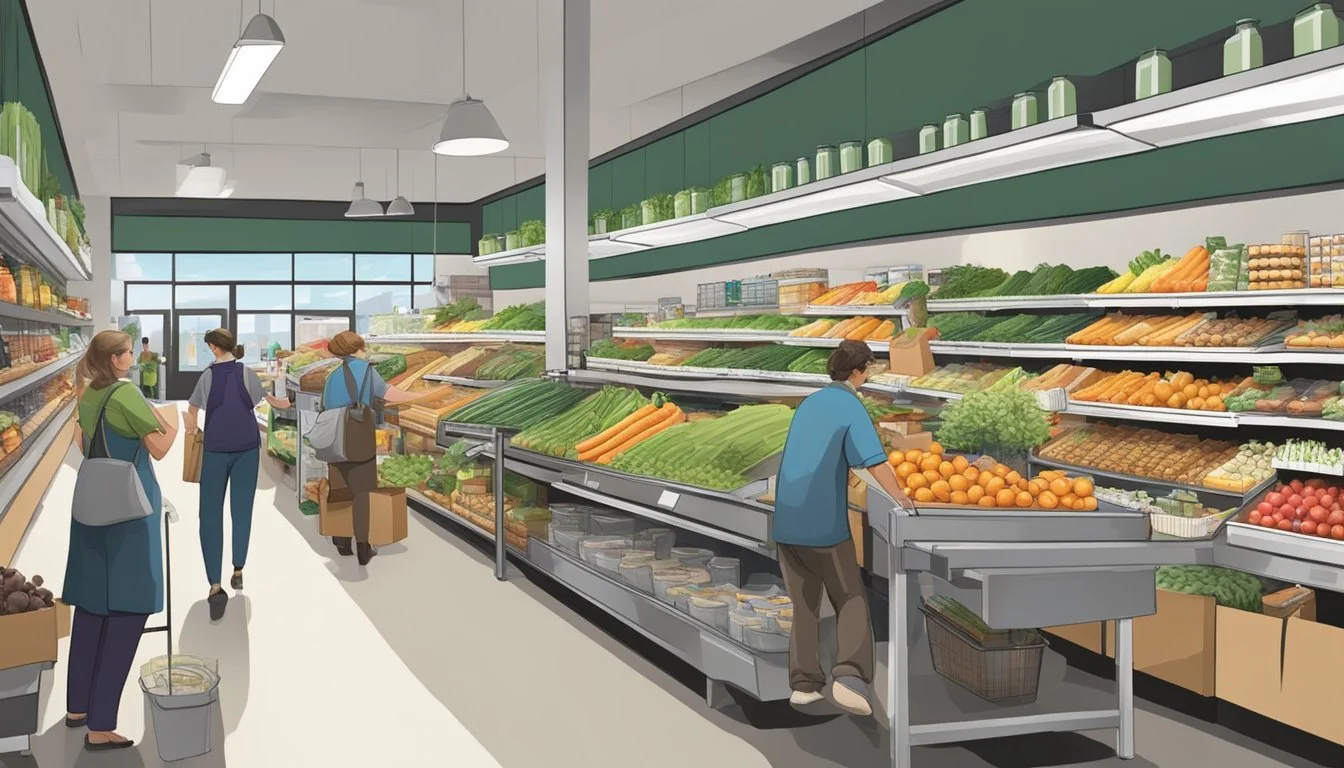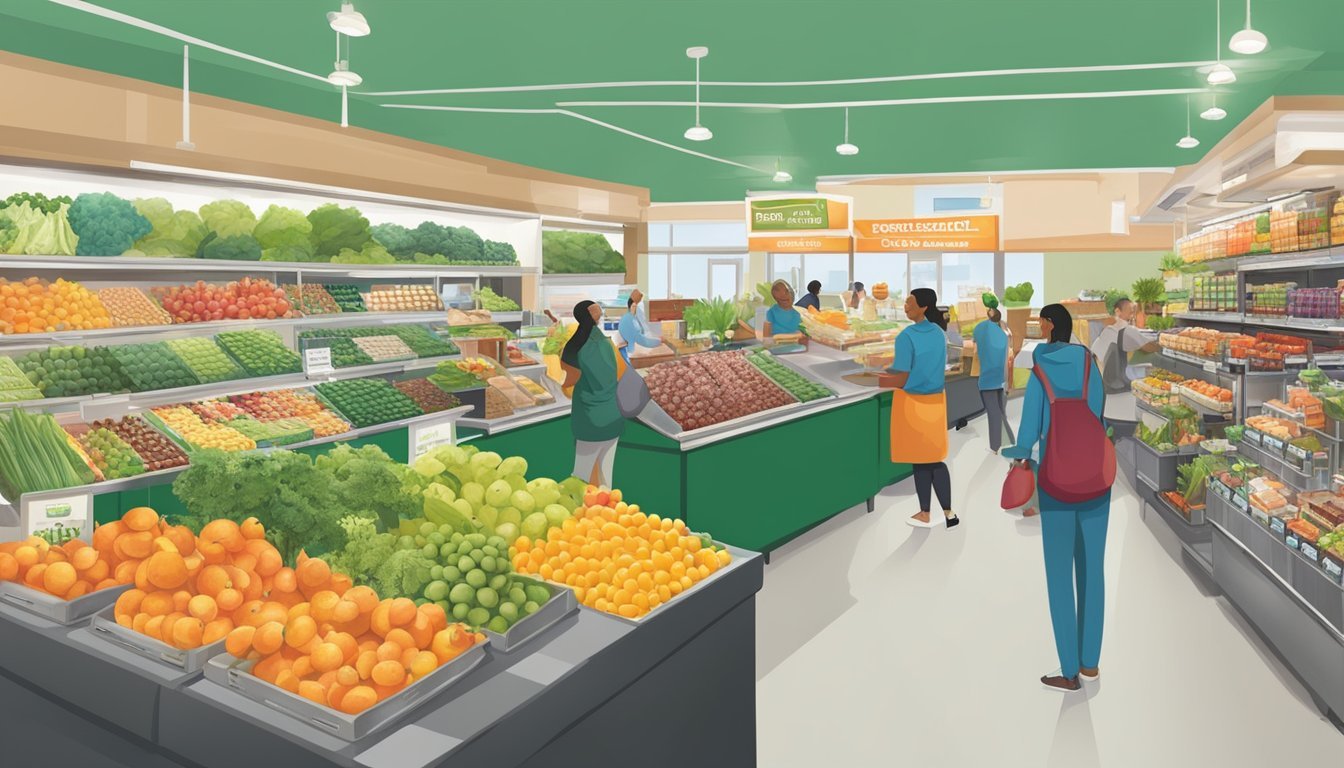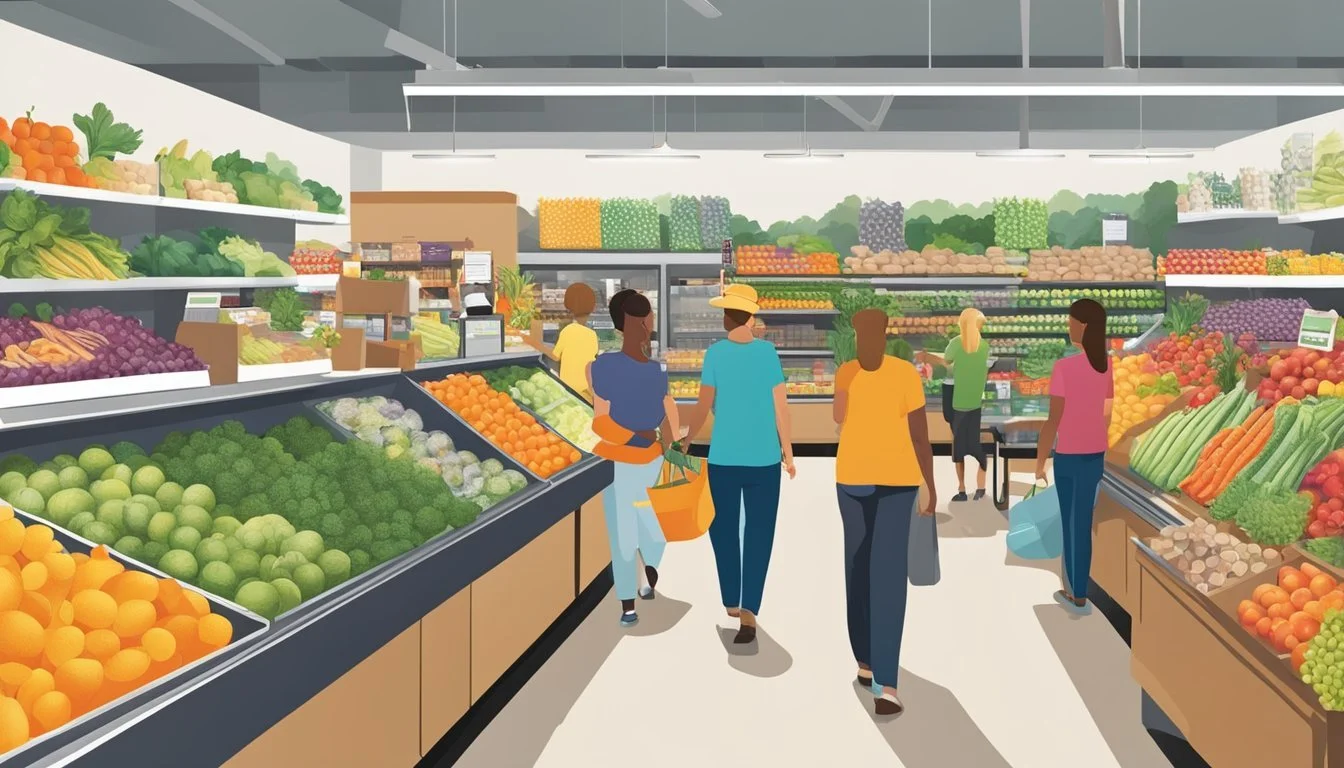Guide to Food Co-Ops in Charlotte, NC
Your Essential Shopping Resource
Charlotte, North Carolina, is becoming increasingly recognized for its vibrant food scene, an integral part of which is the growing number of food cooperatives, or food co-ops. These member-owned establishments offer a distinct alternative to traditional grocery stores by focusing on locally sourced and organic products. They cultivate a sense of community and provide an avenue for consumers who are passionate about sustainably produced food and who advocate for a more equitable food system. Food co-ops are democratic entities, where the members make key decisions and reap the benefits of shared ownership, often including better prices for high-quality products.
In the heart of Charlotte, food co-ops serve as pivotal nodes in the local food chain, connecting urban consumers with the region's agricultural heritage. By supporting these co-ops, residents are not only accessing fresh, nutritious foods but also contributing to the local economy and helping to maintain the viability of small family farms and artisan producers. With initiatives such as these, Charlotte is addressing food insecurity and promoting health and well-being across diverse communities.
As Charlotte continues its rapid growth, these cooperative ventures are more than just alternatives to the supermarket; they are testaments to a collective endeavor towards sustainable living. The popularity of these markets underscores an increasing awareness and desire among Charlotte residents to invest in food sources that are both ethical and community-centric.
What Are Food Co-Ops?
Food cooperatives, or food co-ops, can be seen as a grassroots movement in the food industry where quality and community reign supreme. They operate on member-driven principles that often support local economies and sustainable practices.
Defining Food Cooperatives
Food Co-Ops are collaborative entities owned and run by their members, who typically pay a fee to join. These members share a mutual goal of gaining access to high-quality, fairly-priced food. Cooperative Principles guide these organizations, which include voluntary and open membership, democratic member control, member economic participation, autonomy and independence, education and training, cooperation among cooperatives, and concern for community.
History of Food Co-Ops in the US
The concept of a cooperative is not new in America; it traces its roots back to the early 19th century. In the United States, modern Food Cooperatives gained traction in the 1960s and 1970s as part of a movement towards more organic and responsibly sourced products. They provided an alternative to mainstream grocery stores, focusing instead on community involvement and health-conscious living. Food cooperatives have since evolved, but they continue to emphasize local food systems and sustainable agriculture.
Benefits of Food Co-Ops
Food Co-ops in Charlotte, NC are gaining attention for their various contributions to the community, economy, and public health. They stand as a beacon of local collaboration and healthful living.
Community Impact
Food co-ops act as a solution for food insecurity in communities, especially in areas where traditional grocery stores are scarce. In West Charlotte, a predominantly Black neighborhood has experienced decades of corporate grocery disinvestment, prompting community leaders to champion a full-service, community-owned store that offers not just access to food, but also serves as a Community Innovation Incubator. This initiative not only addresses the fresh food gap but also fosters a sense of ownership and pride within the community.
Economic Benefits
These community-operated stores have a significant economic ripple effect. By supporting local producers and ethical suppliers, food co-ops:
Encourage money to circulate within the local economy.
Offer fair employment opportunities with benefits surpassing the national coverage rate for service employees.
Prioritize paying staff local livable wages.
Health Advantages
The health benefits of food co-ops are profound. By focusing on providing fresh produce and other healthful options, these cooperatives align closely with Public Health initiatives. They encourage healthier eating habits and improve access to nutritious food, which is a cornerstone for maintaining and enhancing community health. Food co-ops in Charlotte, NC are important venues for residents seeking to make beneficial dietary changes.
The Role of Food Co-Ops in Charlotte
Charlotte's food co-ops are pivotal in fostering community resilience and spearheading the battle against food scarcity in urban pockets. They are not mere grocery suppliers; they embody a movement towards sustainability and social change.
Addressing Food Deserts
In Mecklenburg County, the implementation of food co-ops is a strategic response to food deserts, particularly in predominantly Black neighborhoods. West Boulevard, for example, benefits from co-ops which provide access to nutritious, affordable food. These co-ops are often community-owned and prioritize member control, ensuring residents have a stake in the establishment and management. University researchers have observed that such communal engagement leads to better food security and reinforces neighborhood cohesion.
Supporting Local Economy
Charlotte's food co-ops are instrumental in invigorating the local economy. They are community-led solutions that generate employment while promoting wealth-building for employee owners and members. By prioritizing the sale of local products, they not only foster a thriving market for indigenous producers but also keep the economic benefits within the community. Food co-ops in Charlotte have proven to be more than sources of sustenance; they are a foundation for local entrepreneurship and economic revitalization.
Key Food Co-Ops in Charlotte, NC
Charlotte's commitment to addressing food insecurity has led to the emergence of key food cooperatives. These co-ops not only provide access to fresh, locally sourced food but also empower communities through ownership and participation.
West Boulevard Neighborhood Coalition
The West Boulevard Neighborhood Coalition champions the cause for food sovereignty in West Charlotte. They've proposed the creation of community-owned food cooperatives on major roads, serving as a beacon for community engagement and local development.
Inlivian Partnership
Inlivian, a dedicated partner in the community's battle against food scarcity, works collaboratively with local cooperatives. This partnership enhances the availability of nutritious food options for residents, fostering a healthier community.
Weaver Street Market Outreach
Weaver Street Market extends its outreach by connecting Charlotte communities with organic and locally grown produce. Their efforts ensure residents have regular access to wholesome food, comparable to conventional grocery stores, but with a focus on community wellbeing and sustainability.
Joining a Food Co-Op
When one joins a food co-operative in Charlotte, NC, they gain access to fresh, locally-sourced food while actively participating in a community-driven business. Membership offers a range of benefits and involves certain contributions and responsibilities tied to decision-making and member control.
Membership Benefits
Access to Fresh and Local Produce: Members usually enjoy the privilege of purchasing fresh, locally grown produce that is often organic or sustainably farmed.
Financial Savings: Though there might be an initial membership fee, members can benefit from potential savings on grocery purchases over time.
Member Discounts: Special discounts and deals are frequently offered exclusively to members.
Supporting Local Economy: By becoming a member, individuals contribute to the local economy and directly support small-scale farmers and producers.
Democratically Involved: Members have a say in the co-op’s operations, influencing the selection of goods and services offered.
Contribution and Responsibilities
Membership Fee: There is typically a one-time or annual membership fee required to join, which contributes to the capital of the co-op.
Volunteering: Members may be encouraged or required to contribute time to help run the co-op, from cashiering to stocking shelves.
Voting Rights: Each member typically has equal voting rights, allowing them to influence decisions that affect the co-op, such as electing board members or deciding on major initiatives.
Active Participation: Members are expected to participate in meetings and other events, contributing to the governance and direction of the co-op.
Members play a pivotal role in maintaining the vitality and success of food co-operatives through their active engagement and control over decision-making processes.
Local and Fresh Produce
Charlotte's food co-ops are dedicated to providing fresh and high-quality produce while supporting local family farmers. This ensures that the community has access to nutritious, locally grown food throughout the different seasons.
Sourcing from Family Farms
Local food cooperatives in Charlotte source their fruits and vegetables primarily from family-owned farms. These partnerships allow co-ops to offer a variety of fresh, locally grown food, contributing to the sustainability of small-scale agriculture and the local economy. Wild Hope Farm is an example of such a provider, known for its organic vegetables and flowers, emphasizing the importance of community-centric farming practices.
Family Farms: Support local economy and sustainable agriculture
Fresh Produce: Ensures high quality and nutritious food
Seasonal Availability
The co-ops in Charlotte are attuned to the natural growing cycles, which means the availability of produce can vary with the seasons. This encourages consumers to eat seasonally, which is typically more sustainable and can lead to enjoying produce at its peak flavor and nutritional value. This seasonal approach also educates the community on the natural agricultural calendar and promotes diverse eating habits throughout the year.
Spring: Tender leafy greens, crisp asparagus
Summer: Juicy tomatoes, sweet corn
Fall: Hearty squashes, robust apples
Winter: Root vegetables, hearty greens
Co-ops play a vital role in ensuring that the local community can consistently enjoy fresh, seasonal produce while supporting the livelihoods of farmers and their families.
Educational Programs and Outreach
Charlotte, NC's food co-ops engage the community not just through sustainable food options, but also through comprehensive educational programs and outreach efforts. They aim to empower consumers with knowledge and provide students with practical learning experiences.
Consumer Education Initiatives
Food co-ops in Charlotte place strong emphasis on consumer education. Such initiatives ensure members and non-members alike are informed about the benefits of cooperative models, healthy eating habits, and the significance of supporting local agriculture.
In-store Workshops and Events: Co-ops frequently host events to discuss topics like nutritional quality, food preparation, and the environmental impact of food choices.
Literature and Online Resources: They provide educational materials both in print and digitally, catering to a community that values transparent and responsible consumerism.
University Collaborations
Universities in Charlotte, including UNC Charlotte and Johnson C. Smith University, participate in collaborations with local food co-ops to enhance the educational outreach.
UNC Charlotte: Collaborative efforts may take the form of research projects or hands-on student involvement in the co-op's operations, aligning academic learning with real-world application.
Johnson C. Smith University: Partnerships can involve joint community service initiatives that focus on addressing food insecurity and educating residents on food distribution challenges.
These educational partnerships between food co-ops and universities help foster a well-informed community that recognizes the value of sustainable food systems and cooperative economics.
Economic and Public Health Perspectives
Food co-ops in Charlotte, NC, present a pivotal opportunity to address public health issues and stimulate financial investment in local communities. These innovative solutions not only offer fresh and nutritious food options but also serve as a key leveraging point for community development and health enhancement.
Improving Public Health Outcomes
Food co-ops are instrumental in mitigating public health issues, primarily by increasing access to healthy food within neighborhoods. Areas like West Charlotte, which have historically faced barriers to obtaining fresh produce, are witnessing a transformation as they embrace community-owned grocery stores. This shift is poised not just to enhance nutrition but to also potentially reduce the social determinants of health in predominantly Black communities. The establishment of food co-ops entails a commitment to public health, as availability of nutritious foods is a cornerstone for an active and healthy lifestyle.
Economic Impact on Local Communities
From an economic standpoint, the introduction of food co-ops is a significant financial investment that fosters local enterprise and job creation. Notably, The Community Innovation Incubator has been at the forefront, collaborating with entities like UNC Charlotte and local leaders to identify effective strategies that support food access. The economic ripple effect of such endeavors is profound, as they contribute to community wealth building and instigate further economic development within marginalized areas. Recognized by Mecklenburg County commissioners as a top priority, financial resources have been allocated to ensure that food co-ops not only thrive but also become sustainable economic engines for the communities they serve.
Future of Food Co-Ops in Charlotte
The upcoming years for food cooperatives in Charlotte, NC, show a promising trajectory focused on intentional strategic planning, visionary leadership, and innovative design solutions aimed at fostering food security and community empowerment.
Strategic Growth and Expansion
Strategic planning is key to the effective growth and expansion of Charlotte's food co-ops. The West Boulevard Neighborhood Coalition demonstrates this through their implementation of a new community-owned grocery store known as Three Sisters Market. This food cooperative aims to provide access to fresh, affordable food to the historically underserved areas along West Boulevard, aligning with the city's broader vision of creating 10-Minute Neighborhoods where essential amenities are within a close radius.
Key Aspects:
Location: Intersection of Clanton and West Boulevard
Scope: Approximately 12,000 square-foot store
Purpose: Enhancing food accessibility in predominantly Black neighborhoods
Innovation and Trends
In terms of design and innovation, Charlotte's approach includes addressing food deserts through modern, community-centric solutions. Food co-ops like Three Sisters Market are integrating local input and support to tailor their services in line with community needs. This innovative strategy not only enhances the food co-op's relevance but also fosters a sense of ownership among local residents.
Upcoming Trends:
Community Engagement: Design solutions that reflect local preferences
Grant Support: Utilizing a $272,000 grant for the Community Innovation Incubator
Sustainability: Focusing on tree-shaded areas for comfort and environmental benefits
In conclusion, food co-ops in Charlotte are poised for transformative growth, guided by strong strategic frameworks and innovative community-driven models.
Resources and Additional Information
In this section, readers are provided with specific resources to gain a deeper understanding of food co-operatives in Charlotte, NC, and to locate them within the community.
Charlotte-Mecklenburg Quality of Life Dashboard
The Charlotte-Mecklenburg Quality of Life Dashboard is a rich resource that offers detailed demographic, economic, and social data for Charlotte neighborhoods. It's an essential tool for community members and researchers examining food insecurity, and provides insights on where food co-ops could make a significant impact.
Access the Dashboard: Quality of Life Dashboard
Relevance: Food Access indicators can help identify areas potentially in need of food co-ops.
Map of Charlotte's Food Co-Ops
A comprehensive Map of Charlotte's Food Co-Ops highlights the exact locations of food cooperatives within the city, giving shoppers an easy way to find local, community-owned grocery options.
Interactive Map Feature: Pinpoints co-op locations, hours of operation, and contact information.
Usage: Simply visit the provided link or utilize local listings and GIS systems for up-to-date information.
Conclusion
Charlotte's approach to addressing food insecurity through the establishment of community-owned food co-ops is a progressive step towards sustainable, equitable food systems. These co-ops are not merely stores but catalysts for community development and racial equity. They offer a practical model for communities to take charge of their food sources while creating a self-supporting network of supply and demand within their locale.
Key Benefits Highlighted:
Self-Governance: Community members have a voice and stake in the operations and offerings of the co-op.
Economic Empowerment: Profits are reinvested into the community, supporting local growth.
Healthier Options: Access to fresh, locally sourced food contributes to better health outcomes.
Education: Co-ops often engage in community education around nutrition and food sustainability.
The impact of such initiatives extends beyond West Charlotte, setting a precedent for other communities to emulate. The University of North Carolina at Charlotte has been involved in aiding these studies, indicating a strong academic-community partnership that underpins these efforts.
Ultimately, food co-ops in Charlotte signify more than a response to food scarcity; they represent a meaningful step toward building resilient communities through cooperative economics and shared responsibility. As such interventions continue to gain traction, the potential for scalable, positive change in Charlotte’s local food systems is promising.







